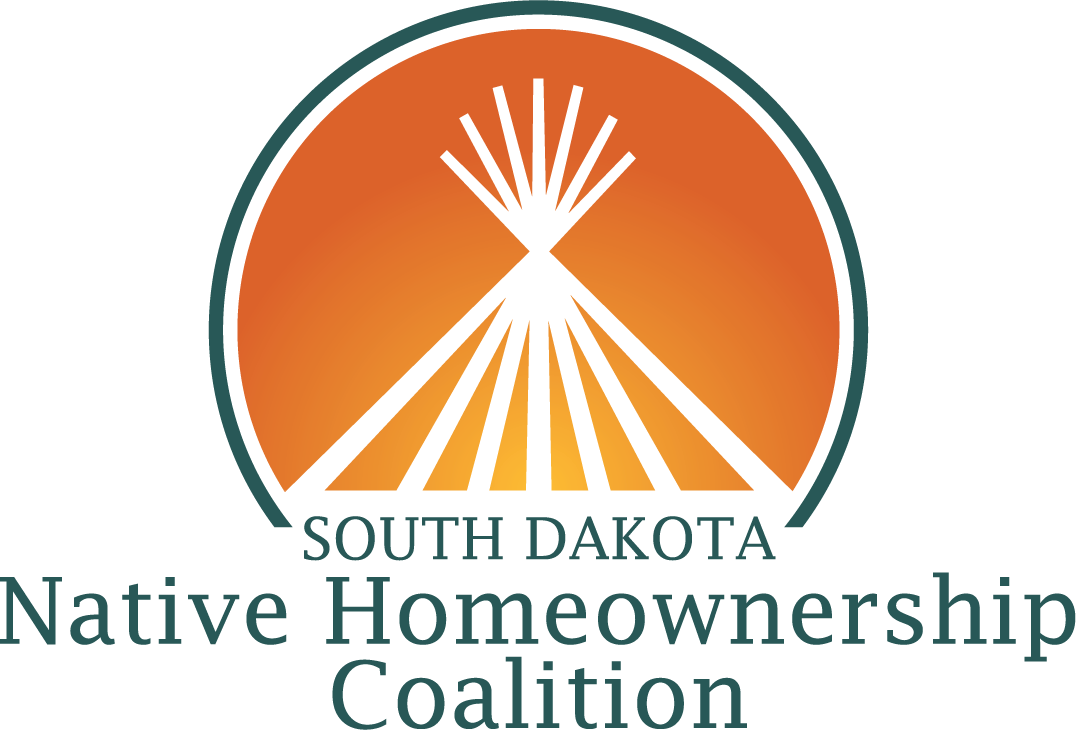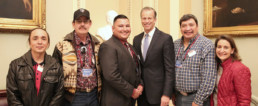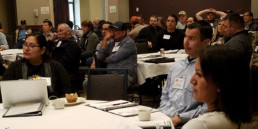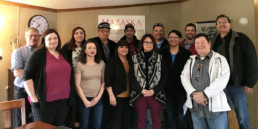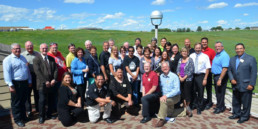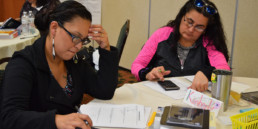Coalition Members Head to Washington to Advocate for Native Homeownership
Earlier this month, representatives of the Coalition’s Policy Committee traveled to Washington, DC to advocate for policies to promote Native homeownership in conjunction with the National American Indian Housing Council (NAIHC) Legislative Conference. While in DC, the delegation held meetings with representatives from US Department of Housing and Urban Development, US Department of Agriculture, and US Department of Veterans Affairs (VA). The delegation discussed the proposed 502 relending demonstration (where Native CDFIs would relend 502 funds to qualified borrowers) as well the HUD 184 guaranteed loan product and strategies to increase the number of Native American Direct Loans (NADL) originated by the VA. The delegation also meet with the North Dakota and South Dakota Senators, and Senate Committee on Indian Affairs staff.
Featured in image: Members of the SD Native Homeownership Coalition met with Senator John Thune (R-SD) to discussion Native homeownership. From left to right, Mark Witt, Rosebud Tribal Veteran Service Officer (TVSO); Robert Dunsmore, Cheyenne River Sioux Tribe TVSO; Darrel Hernandez, Oglala Sioux Tribe TVSO; Senator John Thune; JC Crawford, Executive Director, Sisseton Wahpeton Housing Authority; and Joanna Donohoe, Co-Facilitator, SDNHOC.
Coalition Working on Multiple Fronts to Support Native Construction Industry
Recognizing that the lack of housing stock is a real barrier to homeownership in Native communities, the Coalition is working hard to support local contractors and encourage them to build more homes. We are excited about developing the following programming to support our Native construction industry:
Construction Internship Pilot Program – Summer 2017
After hearing from contractors that finding employment-ready workers is a challenge, in summer 2017, the Coalition launched a pilot internship program to place building trades students from Oglala Lakota College with local contractors. Through the program, students on the Pine Ridge and Cheyenne River Reservations gained valuable hands-on construction experience, while contractors had the chance to test out potential employees in a risk-free setting. The program was managed by our Native CDFI partners – Four Bands Community Fund on Cheyenne River and Lakota Funds on Pine Ridge – who also provided financial education classes to participants. Based on input from interns, contractors, and partners, the program was a huge success; of the 11 students who completed the internship, 9 received job offers from their contractors.
Building on this success, we plan to expand to additional tribal communities in summer 2018. To learn more about the construction internship program, click below to download your copy of the program report.
Contractor Workshop – Jan 31, 2018 – Rapid City
In January 2018, the Coalition’s Veterans Committee organized a one-day workshop for contractors focused on how to work with loan products available for building on trust land. With over 65 participants and contractors from around the state, the workshop was very well attended, and feedback was overwhelmingly positive.
According to one contractor:
“It was a great turnout. A lot of beneficial information provided and networking.”
The day’s agenda included contractor and lender perspectives on working with the HUD 184 loan, information on the VA’s Native American Direct Loan (NADL) and USDA’s 502 loan, resources provided by Native CDFIs, and recognition of the summer 2017 interns and contractors.
Inspector Certification Training – February 27-March 2, 2018 – Rapid City
Understanding that the shortage of certified building inspectors can delay the construction process, the Coalition is also working to increase the number of certified inspectors working in tribal communities. Our goal is to have at least one certified inspector on each reservation in South Dakota. This winter, we held an intensive four-day training to prepare participants for the inspector certification exam, with the actual exam administered on the fourth day of the training. Thirty-one participants attended the training, a combination of independent contractors and housing authority staff. The training was conducted by the International Code Council (ICC), who sent their top instructors to work with our Coalition participants. Feedback about the training was extremely positive; in the words of one participant, “the training was extremely helpful and I appreciate the opportunity to participate.” Another participant stated, “I liked the training – best one I have been at.” Recognizing the value of building codes in providing safety standards, a number of participants have requested support to promote the adoption of building codes in their tribal communities.
Coalition Members Develop Innovative Approach to Increase Native Veteran Homeownership
Two Coalition members, Mazaska Owecaso Otipi Financial (Mazaska) and Lakota Funds, have teamed up to increase homeownership rates for Native American veterans through an innovative new approach that simplifies the path to homeownership. In late February, both organizations were present to support George O’Rourke and Darrel Hernandez as they closed their VA Native American Direct Loans (NADL) and took the final steps toward homeownership on the Pine Ridge Reservation.
Colleen Steele, Executive Director of Mazaska, explains the new approach was born out of listening sessions that were hosted by the Coalition. Through the listening sessions, she heard the stories of several Native American veterans and gained a solid understanding of the barriers they face in achieving homeownership.
“Some of the veterans we talked to had been trying to access mortgage products designed specifically for veterans for more than two years, and we realized that Mazaska could make things a lot easier for them,” says Steele.
Through the new model, Mazaska provides a construction loan to the veteran and then helps them refinance with the Veterans Affairs Native American Direct Loan once the home is constructed. Mazaska also provides homebuyer education and assistance throughout the loan process. Especially during the complex refinance, Mazaska and Lakota Funds work together to provide intensive support to the homebuyer and coordinate with the U.S. Department of Veterans Affairs to keep things moving forward.
George O’Rourke comments on his experience, “The Mazaska program helped make refinancing my home with the Native American Direct Loan a simple quick process. I would like to thank Veterans Affairs for working with Mazaska to create this opportunity for future veterans.”
“It was a long time coming,” says Darrell Hernandez. “I really appreciate the help I received from Mazaska to get the loan finalized so that my family could move into our new home. I am more committed than ever to work with the U.S. Department of Veterans Affairs to streamline the Native American Direct Loan process so that other Native veterans won’t have to wait so long.”
“Our Native American veterans have sacrificed a lot by serving our country. We are glad to serve them as they pursue their homeownership dreams,” says Steele.
Coming Soon: Membership Dues
Moving Towards Sustainability
Our Coalition is Launching Membership Dues!
Over the past three years, our Coalition has been discussing strategies to sustain our operations by diversifying our sources of revenue. To date, we’ve enjoyed terrific support from our funders on the local, state, and national levels.
Last fall at our Coalition planning meeting, we created an ad hoc membership committee to explore these issues more formally. The committee met several times to discuss and develop a membership dues strategy. After approval by the executive committee, the new membership benefits and dues structure is nearly final. We will be rolling out our new membership structure in the coming weeks.
We are excited to enter this new phase of growth of the Coalition. We have heard from many stakeholders how beneficial the Coalition’s activities have been to your operations. We look forward to continuing to collaborate with partners who share our mission to increase homeownership opportunities for South Dakota’s Native people to build strong and healthy communities.
Exciting Homebuyer Education Trainings on the Horizon
Based on the input of Committee members, the Coalition’s Homebuyer Readiness Committee is planning two exciting trainings this spring to support homebuyer practitioners working to teach and support new homebuyers in their communities. We invite you to participate in these classes! Registration information will be coming soon.
Designing and Strengthening Your Homebuyer Education Program
Many of our practitioners have attended financial education and homebuyer instructor trainings and are very familiar with different training curriculums. This training will go a step further – looking at how to design a homebuyer education program, or strengthen an existing program. Discussion will include:
- What should agendas cover?
- What activities can should be included?
- How should training modules be structured?
Through this training, participants will have an opportunity to:
- Engage in hands-on activities to expand and practice their facilitation skills
- Learn and test new interactive training activities
- Create participants’ and trainers’ agendas
- Develop pre- and post- training checklists
- Learn new concepts related to adult education methodology
The training will provide valuable opportunities for peer sharing and discussions, and time to for participants to enhance and strengthen their new and their existing financial and homebuyer education programs.
Creating a Healthy Home
Homeownership means more than budgets and monthly payments. Homebuyer educators can also share important information about home maintenance and creating a healthy home environment. In this class, we will look at practical energy-saving tips, how to make non-toxic, healthy cleaning products with readily-available materials, and how healthy homes contribute to healthy communities. We will also spend time looking at local, native plants and their uses.
